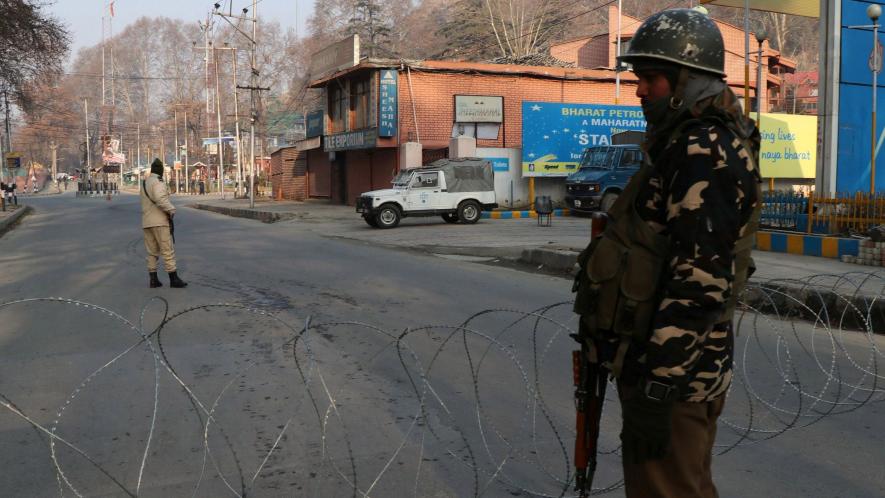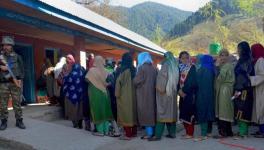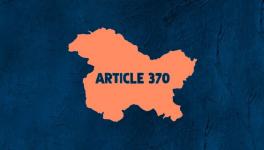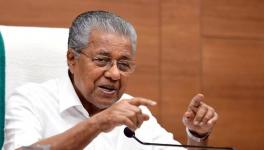J&K: Act in Haste, Repent at Leisure

For all the “legacy problem” that the Bhartiya Janata Party government keeps harping on about, it is remarkable that they are coy when confronted with the shoddy preparations that accompany each of its major ‘initiatives’. It is not just demonetisation and the GST roll-out, but even the J&K Reorganisation Act, 2019 is turning out to be another instance of the Narendra Modi-led government’s policy without homework.
When constitutional safeguards can be taken away from the people by a colonial-minded Indian government, as in Jammu and Kashmir, reducing them to the status of “captives” who are subject to abuse, harassment and violence, there is nothing more left to lose for Kashmiris. Their silence speaks volumes today. Because that is the only way in which people can express themselves while biding their time.
Equally important, while the Kashmiris have been made captives, in Ladakh the earlier elation over the abrogation of Articles 370 and 35A has now been replaced by concern among the locals that they will be swamped by outsiders because they do not have a legislature to protect their lands, jobs and culture. They are also resentful of the fact that despite the recommendation of the National Commission for Schedule Tribes for granting Sixth Schedule status to the entire Ladakh region, the government remains stubbornly opposed to this. In Jammu as well, the fear of losing jobs and land has singed the BJP’s rank and file who have been left clamouring for “domicile status”.
At core of the crisis in J&K are changes in four state laws: the J&K Alienation of Land Act 1995, Big Landed Estates Abolition Act 2007, J&K Land Grants Act 1960 and the Agrarian Reforms Act 1976. While the Reorganisation Act retains some of the land-related acts, but it has done away with these four acts. This means that prohibition against transfer of land in favour of anyone who is not a permanent resident of J&K no longer exists.
Also, the Reorganisation Act gives the Centre powers to formulate and change land laws (and over the police), not to the legislature of the Union Territory of J&K. This diminution is not just symbolic but substantive in so far as the local people of J&K have no control left over the most important matters concerning them.
Faulty Reorganisation
On 12 December, the Centre ruled out a protective law for J&K along the lines of Article 371. The Minister of State for Home Affairs G Kishan Reddy not only ruled this out but also claimed that if residents want such safeguards to protect land, property and resources, they will have to wait for the constitution of a new Legislative Assembly vested with the powers to make laws.”
On the very next day, the Hindu reported that the Ministry of Home Affairs was holding “consultations” to grant Jammu, Ladakh and Kashmir “special status” along the lines of Article 371 (and not Article 371A) as applicable in states such as Maharashtra and Gujarat, which allows for separate boards in areas for “equitable allocation of funds for development work” and “adequate opportunities for employment in services under the control of state government”.
Unlike 371A-G, the plain Article 371 provides for devolution of power by the state executive, which can be withdrawn at any time the executive wants, since it is not a constitutional provision or a law but an administrative convenience.
Domicile status: So how serious is the Indian government about extending protection for local people? J&K’s Public Services Commission had suggested having a separate employment policy for J&K and recommended a local language test for all who apply for jobs—and making only those who have been staying there for 15 years eligible for government jobs, which are a mainstay for the residents of J&K. But the PSC was wound up on 31 October and its recommendation was rejected.
On 26 December the J&K High Court, which has been slow in addressing Habeas Corpus petitions, became the first to come out with an advertisement for 33 non-gazetted posts open to non-residents of J&K and Ladakh. True, they had to withdraw this advertisement on 31 December because it caused such widespread resentment in Jammu, including from the rank and file of the BJP in Jammu. The Indian government had no choice but to make sure this was withdrawn. J&K’s colonial administration instructed all departments not to issue recruitment notice for the “time being” as the central government is “mulling” steps “to protect” land and job rights of the locals.
But from what has appeared in the media based on unnamed government “sources” it appears that the Modi government had no intention to provide safeguards for local people regarding their land and jobs going to outsiders. The dilly-dallying went on for some time until it became clear that the BJP was losing support in Jammu. They had calculated that the people of Jammu would be on board with all that government wanted to do. Instead, within a few days, it became clear that Jammu might be the first to feel the heat of loss of land and jobs and the protests began.
When it became clear that something had to be done, the Modi government made sure that stories suggesting that they would “do something” began to be planted. The same reports also made it clear that whereas some protection would be offered to local people there would be “exemptions” for two sets of people; ex-servicemen and those bureaucrats who have served in J&K. This was precisely the plans the J&K governor had tried to implement and which met with agitations forcing the government to withdraw the plans. By reviving the same plan, a way has been opened up for bringing in people from outside to settle in an already crowded J&K. This opens up a way of changing the demographic character of J&K. Besides, it is also clear from the same news reports that industries or enterprises which are set up in J&K by outsiders, would be allowed to have land for providing residential quarters for employees from outside J&K.
Of course, the question is, why bring employees from outside when there is a severe shortage of jobs for locals and large numbers of the educated unemployed? If this remains the policy of the government then such plans to offer land to investors, retired bureaucrats and ex-servicemen or para military personnel will get around whatever type of domicile status is offered to people of J&K and Ladakh. Not for nothing did the Jammu Chamber of Commerce want “riders” on purchase of land and investments by outsiders, because J&K does not have large chunks of land to offer and end of Article 370 should not make J&K into a “hub of sale and purchase”.
Who will Fund: Another part of the shoddiness was the attempted sleight of hand to ensure that the Centre did not have to bear the responsibility for funding the Union Territory of J&K and Ladakh. The government had provided for “special provision” in the Act for J&K and Ladakh and tried to impress the NK Singh-led 15th Finance Commission to abide by the Act and agree to its demand that money for the Union Territory of J&K would come from states share of the divisible pool and not of the central government. But the 15th Finance Commission clarified that the commission is treating J&K as Union Territory meaning thereby that the share of divisible pool for J&K as a Union Territory must be from the Centre’s share, because a UT cannot be considered a state. He also wondered “how can you treat an UT to be anything other than UT”.
What this means is that the Modi government which has misgoverned the economy and reduced economic activity, thereby ensuring a fall in revenue generation, has to find resources from its share of divisible pool. The government must have been cocksure to get whatever it wanted from the 15th FC, because it also went ahead and announced that government employees salary and benefits will be as per the 7th Pay Commission.
This means an additional Rs 4800 crore, although 7th PC benefits were extended two years ago. For instance, the salary and pensions bill of J&K (including Ladakh) rose from Rs 10,113 crore in 2011-12 to Rs 28,079 crore in 2018-19. So a further increase would take the salary and pension bill to Rs cross Rs 32,000 crore. Since J&K is revenue-poor, where will a resource-starved central government find money?
Delimitation: Yet another reason why the Act has to be amended is the contradictions in the Delimitation plan for J&K which is yet to take shape as confusion prevails over what the Reorganisation Act actually says on Delimitation of constituencies.
The Jammu-based National Panther Party leader claims that Section 63 of the Act says that “Notwithstanding anything contained in in Section 59 to 61, until the relevant figures for the first Census taken after the year 2026 have been published, it shall not be necessary to readjust the division of successor Union Territory of J&K into Assembly and Parliamentary constituencies...”
Section 59-61 on the other hand claim that 2011 census is the basis for delimitation. Besides Section 62(2) of the Reorganisation Act states that the Delimitation Commission is to be constituted under the Delimitation Act 2002, which requires the central government to issue an order published in the official gazette to kickstart the process.
The Election Commission says that once the order is issued it will take nearly a year to complete the exercise. According to “sources” these amendments were needed because contradictions crept in because the Act was drafted in “haste”.
Widespread Scepticism: With such glaring errors stymieing the government’s own diabolic plans, it is no wonder that there is widespread scepticism over the government’s sincerity in erstwhile J&K. For instance, the abolition of the inter-state toll cheered the Jammu Chamber of Traders. However, the Jammu Chamber of Industries warned that 4-5 lakh people will be rendered jobless as local units, hitherto protected, would have to compete with outsiders and will lose out now that octroi has been abolished.
The medium and small scale industries are up in arms because government has opened up its purchase of various goods by inviting outsiders to also bid for government tenders. It is feared that 15,000 workers would be affected by this now that local industries and units no longer enjoy protection.
Meanwhile, at a time when the internet is blocked off and even Jammu has access only to 2G services, the central government held its first Capacity Building Programme on General Financial Rules 2017, e-Procurement and government e-marketplace in Jammu. Union Minister Jitendra Singh boasted that J&K Union Territory will become “model of transformation” for India. While e-transformation of J&K confronts prohibition on internet, all the lies and falsehoods also meet their nemesis.
The Niti Aayog’s Sustainable Development Goals India Index shows that J&K has performed better than most states, including Gujarat, in poverty, hunger, quality education, gender equality, sustainable consumption and production. Gujarat, flaunted by Narendra Modi and the state and central BJP governments as an epitome of all that is good, happens to be at the bottom whereas J&K is in the top three in India. Chances are that with the BJP running J&K it may suffer the same fate as Gujarat’s working women and men.
And so scared is the Modi government of losing its monopoly over news from J&K that its Information and Broadcasting Ministry asked J&K administration to track “resistance art” in Kashmir in order to prevent “different types of art to shape and promote anti-India narratives".
Meanwhile J&K’s administration ensured that people neither receive any news other than what officials clear nor even have access to independent information sources.
As a result, while Modi government’s propaganda and lies flood the corporate media and presents a picture of “normalcy” it is from within that whistles are blown to expose the dangers ahead.
The CRPF, in an internal assessment of the situation in J&K in December 2019 had claimed that prolonged lock-down will give “trouble-makers” an opportunity to “start a new wave of protests and armed struggle”. It had also expressed concerns that CRPF personnel staying in temporary camps are “vulnerable” to militant attacks and held that deployment of large number of personnel and their extended stay could make the force “complacent”. Earlier, in October 2019, a senior CRPF officer told the Indian Express that “the last time I asked Delhi how long the additional troops were supposed to be here, I was told not to ask this question before April next. So we have to be prepared for a long winter, where we will be largely fighting the elements”. And he said, “We do not want to create stress among forces, who are already in a difficult situation.”
In short, the Modi government is creating a “legacy problem” for generations to come with its hasty and shoddy work because those blinded by dogma are unable to fathom truth and reality.
Get the latest reports & analysis with people's perspective on Protests, movements & deep analytical videos, discussions of the current affairs in your Telegram app. Subscribe to NewsClick's Telegram channel & get Real-Time updates on stories, as they get published on our website.
























